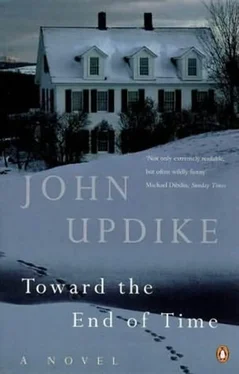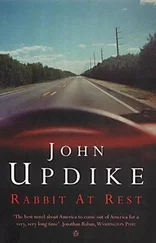John Updike - Toward the End of Time
Здесь есть возможность читать онлайн «John Updike - Toward the End of Time» весь текст электронной книги совершенно бесплатно (целиком полную версию без сокращений). В некоторых случаях можно слушать аудио, скачать через торрент в формате fb2 и присутствует краткое содержание. Жанр: Современная проза, на английском языке. Описание произведения, (предисловие) а так же отзывы посетителей доступны на портале библиотеки ЛибКат.
- Название:Toward the End of Time
- Автор:
- Жанр:
- Год:неизвестен
- ISBN:нет данных
- Рейтинг книги:3 / 5. Голосов: 1
-
Избранное:Добавить в избранное
- Отзывы:
-
Ваша оценка:
- 60
- 1
- 2
- 3
- 4
- 5
Toward the End of Time: краткое содержание, описание и аннотация
Предлагаем к чтению аннотацию, описание, краткое содержание или предисловие (зависит от того, что написал сам автор книги «Toward the End of Time»). Если вы не нашли необходимую информацию о книге — напишите в комментариях, мы постараемся отыскать её.
Toward the End of Time — читать онлайн бесплатно полную книгу (весь текст) целиком
Ниже представлен текст книги, разбитый по страницам. Система сохранения места последней прочитанной страницы, позволяет с удобством читать онлайн бесплатно книгу «Toward the End of Time», без необходимости каждый раз заново искать на чём Вы остановились. Поставьте закладку, и сможете в любой момент перейти на страницу, на которой закончили чтение.
Интервал:
Закладка:
The highest pasture on our stony island consists of grass tufts nibbled by the goats; below the upmost ledges in the growing season sheep graze broad-sloped shoulders of green, the winter lambs near the size of their mothers now and all still as gray boulders in the golden morning sun, heads lowered to feed. The occasional bleat of a lamb imagining himself lost drifts down. A pair of hawks whistle one to the other as they hang watchful in the wind. The herbs and medicinal flowers in their frothy rows nod about my knees-the yellows of the cowslips and feverfew, the purples of hyssop and lavender, the dainty useful greens of mint and cabbage. Brother Vergil before he wasted away of flying venom and the weakness of age explained his arrangement by the humors: here thyme and hyssop, warm and drying herbs, to clear phlegm; there burdock and figwort, cool and dry, to cleanse the sanguine system of gout and diarrhea; here senna and hellebore to purge with their heat the clogging of black bile that induces constipation and melancholy; and there rhubarb and dandelion to counteract with their cool moisture the hot and dry tempers inflicted by an excess of yellow bile. Garlic and basil, coriander and goldenseal-the mute plants do hold in their roots and stems and calyxes and corollas a thousand responses to the multitudinous gaps and imbalances the body in its turmoil poses. God through His vast kindness knots into all the crevices of His flowering creation the essential juices of His peace and love, according to the code declared by the wondrously variegated patterns of the flowers and leaves. Dried aerial parts yield decoctions and poultices no malady can resist. For headache, lavender and feverfew; for boils, a poultice from feverfew; for sore throats, infusions of coneflower roots or loosestrife blooms, added to tincture of astringent, phlegm-reducing herbs like silverweed; for hemorrhoids, ointment of pilewort-there is nothing amiss in our workings without cure in God’s garden. Even warrior’s wounds slowly vanish under applications of self-heal and purple-flowered comfrey, called knitbone by the simple folk. Before the birth of Christ, so gracious is God, He was busy revealing these secrets to the pagan Greeks, the king of whose wisdom was named Aristotle. As I bend my back to the weeding of the aisles of my living church of silent adorers, I beg forgiveness for these many deaths by uprooting, for even weeds too humble to have a name no doubt contain properties that, knowingly extracted and combined, would join them to the chorus of cures. God created nothing to no purpose, though many purposes are yet hidden from us, to be revealed no doubt on the day when the living and the dead alike are summoned in their risen bodies to judgment, and all this finespun intricacy singing about us is revealed as but a filigreed shadow of the glorious true world prepared for His faithful. This day cannot be far off, the abbot says. Indeed, that eight centuries have been allowed to pass since our Lord gave Himself to torture and despair on the Cross would cause Paul and those other early saints to marvel at the fullness of time allowed obdurate Mankind for its own salvation. Those who study the mind of Heaven agree that the world must surely end before the year 1000, since a year of more digits than the Trinity would be a certain blasphemy.
The pigs have started a sudden squealing in their pen of wattles and alder stakes. Looking toward the west, where our humped island like a sundial casts its shrinking morning shadow into the flickering silver of the endless western sea, a flock of sails in the fatal square shape has silently appeared. Slender, they sit on the bright sea with the symmetry of letters, the same dragonish upturn before the mast as after. Perhaps I have been the last to read them, rapt here among the rustle of the herbs, tending and gathering. Now my ears take in shouting from the direction of the abbot’s house and the round tower. I run to the cliffs edge and see fair-bearded men with sun flashing from their close-fitting helmets wading in squat armor onto the shingle despite the roughness of the waves. Some have already arrived in our midst. Shouting and pitiful cries rise to disturb the sheep on their high shoulders of meadow. Their bleating and the slow heartbeat of surf on the beach below all but drown the overheard thuds of struggle. Monks in their sackcloth make no more resistance to broadswords and battle-axes than slugs to the gardener’s knife. The careless growth at the cliffs edge clings with its cold dew and milkweed spittle as I hasten bare-legged away, casting aside my basket half full of fennel plucked for a meal that will now never be served. My stone hut’s beehive shape came into my mind but this sanctum for sleep and for prayer would offer no exit with a roaring demon crouching at the entrance. Beyond the lower walled edge, the cliff breaks away into crevices and shallow trickling caves where a man might outwait a storm. Gulls above circle and dip, curious over the stir but safely aloof. The chapel bell, costly iron that nigh sank the raft that brought it a week’s journey around Dingle, begins to ring madly as if to shatter its own Christian voice, jerked into clamor not by the pull of pious hands but by the mocking strength of a Norseman inflamed by mead and bloody plunder.
I catch my breath behind the shoulder of the stone milking house. Through the chinks of its sloping wall, which release to my nostrils like a final scent of earth that of dung-spattered fresh hay, I spy smoke curling from beyond the oak chapel, the dairthech where so many times I saw the gleaming chalice lifted up amid the intertwining chanting of the brothers. I see that what is afire is the wide reed roof of the tech mor , where we were accustomed to eat and talk, not always without natural men’s gaiety, and those who could read would read at the tables, the leaves of parchment turning stiff as wind-filled sails. Now from the chapel’s entrance streams in gesticulating gobbets a parade of the longhaired fiends in their furs and leather breastplates. One holds aloft our precious chalice, its rim of silver filigree picked out with enamels the bright colors of sheep’s blood and noontime sky: the pattern would swirl beneath my eyes in the moment when Christ’s blood, sweet and strong as dark queen’s honey, was tilted into my lips by the abbot’s white hands. My gullet would feel the thick warmth of God’s inmost being.
The Lothlander holding the chalice aloft now lowers it so that his comrades in pagan brutishness can spit into the pristine vessel and, as with a maiden helpless in their midst, perform worse desecrations from the low parts of their bodies. The great altar candlesticks and fine holy cloths and the cedarwood reliquary inlaid with precious metals and containing the bones of the hand of St. Finnian all flow forth on the stream of booty. The illuminated Gospels stored in a locked chest beneath the chapel lectern have been torn apart for the jewels in the covers, and the bright pages are scattered and trampled. It is a devilish sight that makes my innards sicken for more than myself. Brother Guaire! His knots undone! The thatch of the tech mór shows flags of orange flame, and the smoke from this and other fires dyes the scene like the dipping close of a cloud livid with thunder. In the murky tangle of horrors I see the abbot’s small head, pale and benign, being brandished on the end of a bearded fiend’s pike. The bodies of my brothers, naked and dismembered, are tumbled into the sacred well whose miraculous fresh waters, drawn from beneath the salt sea, had sustained our settlement here. God has forsaken us, to test our faith. The animals as they are led away, roped and hauled or driven with staves, bellow as if on the way to slaughter, but it is not the animals being slaughtered. They will live for yet a while. In this universe turned upside down the chickens ascend in a sprawling of feathers as if to join the gulls indifferently soaring above the havoc.
Читать дальшеИнтервал:
Закладка:
Похожие книги на «Toward the End of Time»
Представляем Вашему вниманию похожие книги на «Toward the End of Time» списком для выбора. Мы отобрали схожую по названию и смыслу литературу в надежде предоставить читателям больше вариантов отыскать новые, интересные, ещё непрочитанные произведения.
Обсуждение, отзывы о книге «Toward the End of Time» и просто собственные мнения читателей. Оставьте ваши комментарии, напишите, что Вы думаете о произведении, его смысле или главных героях. Укажите что конкретно понравилось, а что нет, и почему Вы так считаете.












